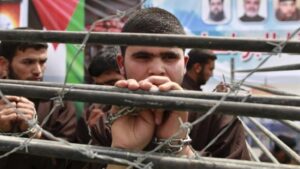The Supreme National Emergency Committee, which brings together inmates from all Palestinian factions, confirmed on Tuesday that the rest of the detainees in Israeli prisons will also continue the protest in a number of ways.
As part of their campaign of disobedience, the detainees agreed on not leaving their cells twice a week for the usual ‘security checks’ and returning meals, as well as dissolving the institutions that represent them before the Tel Aviv authorities.
On March 10th, the inmates agreed to suspend their pressure measures after the Government’s decision to put an end to the reprisals adopted by the National Penitentiary Service (IPS). However, in recent months that body repeatedly failed to comply with the agreement reached.
The punitive measures came into force starting on September 2021, after the escape of six Palestinians from the Gilboa maximum security prison. Although they were caught after a massive manhunt, IPS officials took numerous actions against the rest of the detainees, such as cell transfers, bans on visits, and the reduction of time in the yard, which led to clashes and strikes.
Some 4,500 Palestinians are currently locked up in Israeli prisons, including 31 women and 175 minors.
pgh/llp/acl/rob










